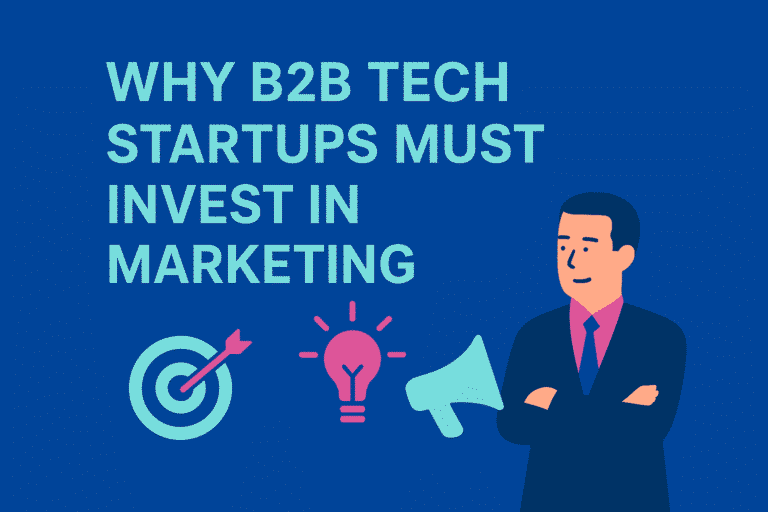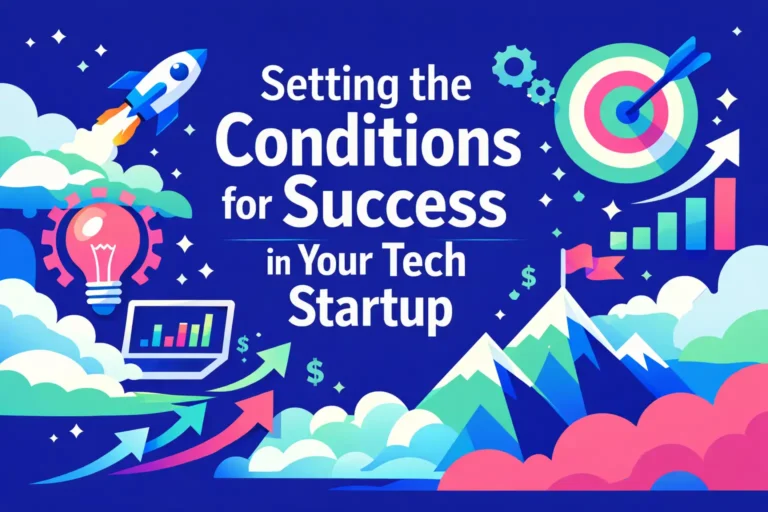Strategy, Execution and Measurement…
Marketing is the engine that drives growth and success for B2B tech startups. To achieve sustained success, marketing efforts must be holistic and well-balanced. The “Holy Trinity” of B2B tech marketing comprises three core components: strategy, execution and measurement. Each of these fundamentals plays a vital role, and their harmonious integration is essential for driving results. Founders that commit more attention and resources to ordering company branded hoodies than marketing need not read on, your future is pre-ordained.

1. Strategy – The Guiding Vision
At the heart of any successful marketing effort is a clear and powerful vision, underpinned by a well-defined strategy. Strategy is the foundation that sets the direction for all business activities. Marketing must have a deep understanding of your target market, define the value proposition and create a plan for reaching target prospects. In a B2B tech startup, where resources are limited, having a clear and focused strategy is crucial to ensuring that efforts are aligned with business goals and that resources are used efficiently.
Key Components of Your Marketing Strategy:
- Market Research: This involves a comprehensive understanding of the market, including the competitive landscape, the target customers and their specific needs.
- Target Audience Definition: Also known as the Ideal Customer Profile (ICP). This is where you identify the industries, sectors, specific companies and individual decision-makers that are most likely to be responsive to your messaging and benefit from your tech solution. You need to know specifically who they are and how many of them there are.
- Value Proposition: Articulate the unique benefits and differentiators of your offering. What is your unfair advantage?
- Go-to-Market Plan: Outline how and when you will reach your target audience, including messaging, routes to market and tactics.
2. Execute the Plan – Bringing Your Strategy to Life
A brilliant strategy is only as good as its execution, and to do that takes time, energy and focus. Execution is the process of turning the strategy into action through carefully planned and coordinated marketing activities. This requires the implementation of campaigns, use of content, digital marketing, sales enablement and customer engagement. For B2B tech startups, execution is about turning plans into tangible outcomes; anything else is a distraction. This means resources and investment must be made available; don’t expect miracles if you don’t invest in marketing.
Top 5 Components of Tech Marketing Execution:
- Campaign Management: Develop, launch and manage marketing campaigns that target and resonate with the personas within prospect companies, as defined by your ICP.
- Content Creation: Produce high-quality, thought leadership content, such as whitepapers, case studies, webinars, eGuides, infographics, social posts, videos and blogs that educate and engage prospects.
- Digital Marketing: Leverage digital channels, such as social media, email and search engine marketing, to reach and convert potential customers.
- Sales Enablement: Equip your sales team with the tools, content and training they need to close deals effectively.
- Alignment and Focus: All teams must be aligned and focused on the plan, which is especially relevant to marketing and sales, as they must work seamlessly on the go-to-market activities to be effective. Tech startups that maintain full focus on the plan will stand a better chance of survival and possibly even achieve their goals.
3. Measurement – Ensuring Continuous Review and Improvement
The third part of the “Holy Trinity” is measurement. It’s essential to track and analyse the simple things that matter – but an overemphasis on measuring too much is not that helpful. The overall performance of marketing and sales efforts is what counts, so you can understand what’s working, what needs improvement and adjust as appropriate. Measurement allows you to review activity and make informed decisions to optimise campaigns and demonstrate a return on investment (ROI). Without measurement, even the best strategy and execution may not achieve their full potential, as it will be difficult to assess any impact or make the required changes. Decide what’s important to you and measure those things diligently, rather than turning every single activity into a meaningless metric.
Top 4 Components of Your Measurement:
- Key Performance Indicators (KPIs): Define the key metrics that align with your business goals, such as lead generation, sales pipeline, conversion rates, cost of customer acquisition (CAC), lifetime value (LTV), impact on EBITDA and so on.
- Analytics: Utilising platforms like Google Analytics, marketing automation tools and CRM systems, you can track performance data and build meaningful dashboards.
- Reporting and Analysis: Regularly review the effectiveness of campaigns and initiatives, so you can make investment decisions on where to focus next and how to improve. Bear in mind, your startup may not generate enough data in the early stages to be meaningful; this is where experience comes in.
- Test Everything: Experiment with different approaches, messages, techniques and tactics to determine what is the most effective. Every marketing activity is a test; you don’t know what will resonate with your audience until you try it and measure the results. Don’t be afraid of failure, that’s how we learn what works and what doesn’t.
The Importance of Balance and Synergy
Just as the Holy Trinity in religious contexts represents a perfect balance and unity, the three main aspects of B2B tech marketing must work together in harmony. A strategy without execution is just a plan on paper; execution without measurement can lead to wasted resources and missed opportunities; and measurement without a strategy provides data without direction. Achieving growth acceleration requires integrating all three aspects into a cohesive and synergistic approach. When strategy, execution and measurement are aligned, they create a powerful engine that represents a solid foundation to build on. It helps you to navigate the complexities of the market and move closer to achieving your goals. What binds the three components together is the discipline to stay focused on the mission, something startups can sometimes struggle with, especially if their founders have an unhealthy predisposition to distraction.
Discipline Beats Distraction
The discipline to stay focused, especially in early-stage businesses, is so vital that it is one of the factors that can determine the difference between success or failure. It’s difficult for many founders to rein in their entrepreneurial spirit, even after starting a new business, as they continually generate new ideas and business concepts. Although there is nothing inherently wrong with having ideas, each time one of them is pursued, it will take time, energy and resources away from the core business. If done at the most vulnerable stages of a nascent company, when focus is paramount, this can accelerate failure. If there were another Holy Trinity of tech startup marketing, it would be: focus, focus, focus!
You may want to read: “Why Marketing is the Most Important Activity for B2B Tech Startups.”






